Meeting of the Minds forum provides focus for aligning regional efforts

There are a number of initiatives on Vancouver Island that are focusing upon the theme of sustainability. The Vancouver Island section of the Brtish Columbia Water & Waste Association (BCWWA) has encouraged such linkage and sought out partnerships to reinforce the common theme of sustainability based upon an island-wide communication information exchange network. To launch the networking process, the first Meeting of the Minds workshop was held in Parksville in September 2005. The second in the series was held in May 2006, again in Parksville.
2005 Parksville Workshop
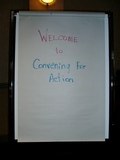 Thirty-five participants from a broad range of agencies attended the September 2005 Workshop. This included representation from the federal and provincial governments, regional districts, municipalities, First Nations, non-government organizations, the Coastal Water Suppliers Association, consultants, business sector, BCWWA and the Environmental Operators Certification Program (EOCP).
Thirty-five participants from a broad range of agencies attended the September 2005 Workshop. This included representation from the federal and provincial governments, regional districts, municipalities, First Nations, non-government organizations, the Coastal Water Suppliers Association, consultants, business sector, BCWWA and the Environmental Operators Certification Program (EOCP).
Workshop Outcomes
Through discussion, participants indicated their expectations of the workshop, then identified Vancouver Island water and wastewater issues and possible solutions, which were subsequently clustered into five broad categories, namely: Education, Infrastructure, Sustainability, Funding and Governance. For more details, please click on Summary Report on Meeting of the Minds Workshop in September 2005
It was the consensus of the group that the dialogue initiated at the workshop continue in the future with the goal of building an effective long-term communications network addressing issues facing both the public and the water and wastewater industry on Vancouver Island. As an interim step, an ad hoc committee was formed to establish future directions. Mac Fraser, Chief Administrative Officer of the Village of Cumberland, was named Chair.
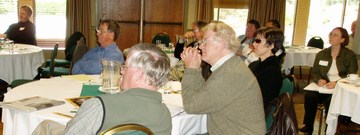
2006 Parksville Workshop
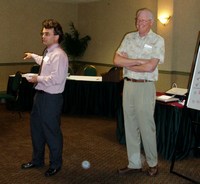 According to Mac Fraser (left), “The organizing committee met over a six-month period to structure a gathering that will advance the important issues raised at the first Parksville Workshop and yet include time to further discuss the issues of sustainability on Vancouver Island. The organizing committee agonized over the format of the second Parksville Workshop and decided upon short presentations without question periods but ample time for discussion during a coffee break, lunch and most importantly open, facilitated discussion (by Kerry Elfstrom) for up to two and half hours.”
According to Mac Fraser (left), “The organizing committee met over a six-month period to structure a gathering that will advance the important issues raised at the first Parksville Workshop and yet include time to further discuss the issues of sustainability on Vancouver Island. The organizing committee agonized over the format of the second Parksville Workshop and decided upon short presentations without question periods but ample time for discussion during a coffee break, lunch and most importantly open, facilitated discussion (by Kerry Elfstrom) for up to two and half hours.”
“We believe that sustainability needs to be addressed in an holistic manner. For this reason we structured the workshop program aropund the five subject areas arising from the 2005 workshop”, added Fraser, “Our thinking was that hearing five perspectives before an open discussion would keep everyone’s minds open and inquisitive.”
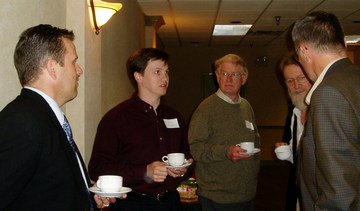
Workshop Design
To set the context for the day’s activities, the facilitator 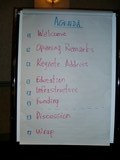 announced a title for the workshop, a purpose/outcome and major principle.
announced a title for the workshop, a purpose/outcome and major principle.
- The titleof the meeting announced to the participants was, “Convening For Action”. It was explained that the intention of the session was more than dialogue. Rather, it was dialogue that leads to action.
- The purposeof the meeting stated at the start of the workshop was, “How do we entrench the network to continue the communication?” This was then positioned as the outcome for the day and would be the focal point of the discussion in the afternoon.
- A major principle, agreed to by the organizing committee, was announced to frame the presentations and discussions for the day, “Sustainability needs to be addressed in a holistic manner. As the participants in the initial workshop had agreed, the issue that everyone was struggling with is that water management is systemic even though there are 5 major touch points: Education, Infrastructure, Funding, Growth and Governance.”
A synthesis of the presentations and the subsequent discussion is presented in the Summary Report on Meeting of the Minds Workshop in May 2006
Presentations
Four presentations were delivered. At the start and end of each one, introductory and summary statements were delivered by the facilitator
KEYNOTE ADDRESS: Assessing and Quantifying Green Value by Chris Corps
EDUCATION: Convening for Action on Vancouver Island: It Starts with a Teachable Moment by Kim Stephens
Rick Lloyd (left) and Vern Rogers (right) delivered a tag-team presentation on infrastructure, with Rick providing a municipal practitioner’s perspective while Vern elaborated on the mandate of the Sustainable Infrastructure Society – which is “To assist in the development and application of technology and resources for building the managerial, financial, and operational capacity … community infrastructure….in BC.”
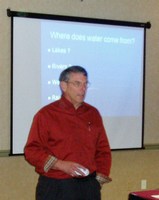
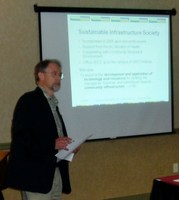
SUSTAINABLE INFRASTRUCTURE 1: Infrastructure Matters by Rick Lloyd
SUSTAINABLE INFRASTRUCTURE 2: Sustainable Infrastructure Society: An Introduction by Vern Rogers
FUNDING: Provincial Infrastructure Funding Programs – An Overview by Glen Brown
The following are not direct quotes. These were delivered to provide a context for each topic and to attempt to provoke the participants to tie the topics together.
Keynote Address:
- Introductory Statement: “This presentation will set the context for the rest of the presentations and deals with the broadest picture while the others will deal with 3 of the 5 touch points. It’s important for you to recognize that if you want to initiate action, you need to speak a different language and think outside the box.”
- Summary Statement: “This presentation has challenged you to think in an entirely different way. If you want to get people to pay attention, use information framed in messages they can understand and put your issue (water) at the front of the equation, not the end. In addition, you need to present the big picture and show how all the pieces relate to each other in a holistic or integrated way.”
Education:
- Introductory Statement: “Now let’s move from the general to the specific.
 As you hear the next set of presentations, always keep the big picture in mind. As someone said, ‘If we define the bigger picture simply, then the small parts make sense’. The first of the small parts you’ll be considering today, that you voiced a consensus of interest in at the Sept meeting, is education. In fact, education is at the heart of sustainability. The keynote address emphasized that what needs to happen is getting the public to care about and ‘value’ water”.
As you hear the next set of presentations, always keep the big picture in mind. As someone said, ‘If we define the bigger picture simply, then the small parts make sense’. The first of the small parts you’ll be considering today, that you voiced a consensus of interest in at the Sept meeting, is education. In fact, education is at the heart of sustainability. The keynote address emphasized that what needs to happen is getting the public to care about and ‘value’ water”. - Summary Statement: “This presentation has begun to connect some dots. Education was mentioned in the keynote address and now you’ve heard that if you want to influence individuals or groups, you need to provide information that leads people to action. In other words, simply telling people information that you think is important does not necessarily motivate people to take action. They have to care about the information, and that reinforces what was said in the keynote address about finding information and relaying it in a way that affects people’s beliefs.”
Infrastructure:
- Introductory Statement: “Part of the education you need to provide to the people you want to influence involves appropriate descriptions about infrastructure. In this presentation you’ll hear about some of the issues associated with trying to be innovative with infrastructure.”
- Summary Statement: “This presentation has connected a few more dots. You just heard that sustainability requires understanding which comes from education. It also needs appropriate and innovative infrastructure. It’s important to be complete and accurate when defining your infrastructure needs.”
Funding:
- Introductory Statement: “At the last workshop, one of the most frustrating topics discussed was access to, and the most effective use of, funding. Obviously, infrastructure requires appropriate funding.”
- Summary Statement: “Funding is one more dot to connect in the water management picture. This presentation has illustrated that there are funding sources available but you need to reposition some of your issues so that it meets the criteria for selection.”
The group was then split into two teams and asked to discuss the information they had received fromt the presentations in the morning.
Going Forward
A wrap up session followed the discussion in which the initial planning group was asked if they wished to continue acting in an ad hoc manner to which all replied positively. The organizing/steering group consists of:
- Mac Fraser, Chair, Village of Cumberland
- Eric Bonham, BC Water & Waste Association
- John Finnie, Nanaimo Regional District
- Patrick Lucey, Aqua-Tex Scientific Consulting Ltd.
- Graeme Bethel, Terasen

